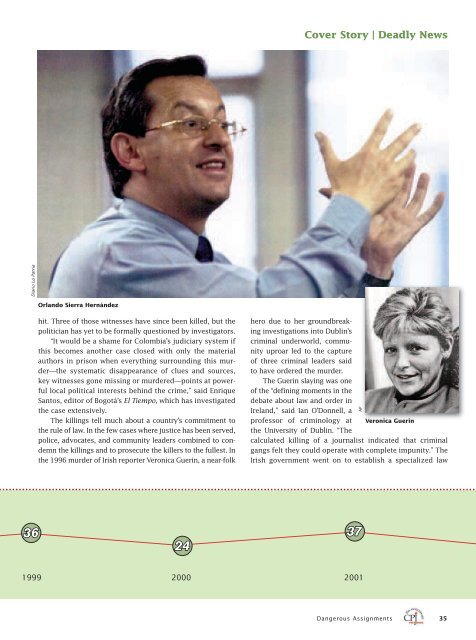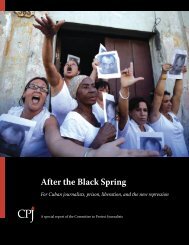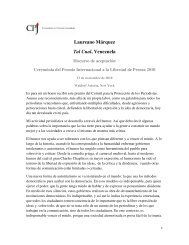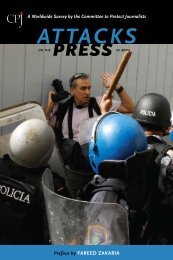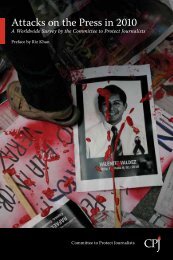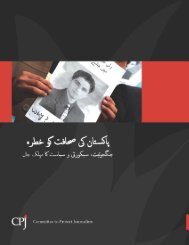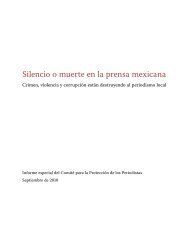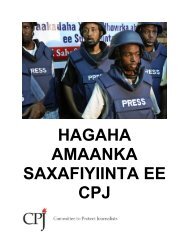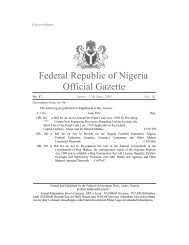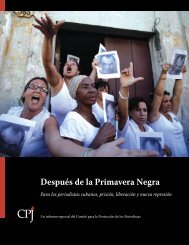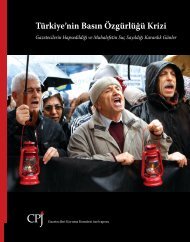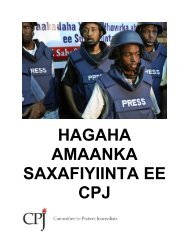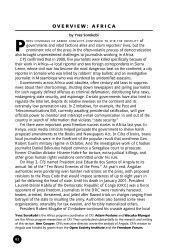Read the magazine online (PDF) - Committee to Protect Journalists
Read the magazine online (PDF) - Committee to Protect Journalists
Read the magazine online (PDF) - Committee to Protect Journalists
Create successful ePaper yourself
Turn your PDF publications into a flip-book with our unique Google optimized e-Paper software.
Mission Journal<br />
Radio Rage<br />
Political influence permeates radio news in Brazil’s remote Nor<strong>the</strong>ast.<br />
Radio hosts and independent journalism are victims.<br />
By Carlos Lauría and Sauro González Rodríguez<br />
FORTALEZA, Brazil<br />
Radio reigns as <strong>the</strong> most popular news medium in <strong>the</strong><br />
isolated, impoverished Brazilian Nor<strong>the</strong>ast, where on-air commenta<strong>to</strong>rs<br />
are passionately populist and widely known figures. Many are closely tied<br />
<strong>to</strong> politically owned or controlled radio stations, which are booming in<br />
number throughout <strong>the</strong> interior, often in defiance of <strong>the</strong> law.<br />
Outsized, outspoken, and highly partisan, <strong>the</strong>se commenta<strong>to</strong>rs have<br />
also become targets of violence. Five radio journalists have been killed in<br />
as many years in this region alone, making <strong>the</strong> Brazilian Nor<strong>the</strong>ast one of<br />
<strong>the</strong> deadliest areas for journalists in <strong>the</strong> Americas.<br />
Throughout <strong>the</strong> Nor<strong>the</strong>ast interior, radio commenta<strong>to</strong>rs are routinely<br />
involved in politics, campaigning for allies with ardor, attacking foes with a<br />
vengeance, and using <strong>the</strong> airwaves as a springboard for <strong>the</strong>ir own political<br />
aspirations. Many are “self-made” journalists; very few are considered independent.<br />
Little, it seems, is out of bounds on <strong>the</strong> air: Accusations of extramarital<br />
affairs and criminal wrongdoing are hurled without restraint or<br />
attention <strong>to</strong> fact.<br />
Yet <strong>the</strong>se commenta<strong>to</strong>rs have also become reposi<strong>to</strong>ries for a poor<br />
population’s hopes and expectations, giving voice <strong>to</strong> <strong>the</strong>ir everyday concerns<br />
and directly intervening <strong>to</strong> provide assistance. That may explain<br />
why even a local stadium could not accommodate <strong>the</strong> crowds that<br />
thronged <strong>the</strong> wake of one such commenta<strong>to</strong>r, Nicanor Linhares Batista,<br />
who was assassinated in his recording booth in <strong>the</strong> state of Ceará in 2003.<br />
Political rivals are accused of plotting <strong>the</strong> murder in retribution for his<br />
commentary.<br />
The slayings of journalists like Linhares—whose populist appeal<br />
runs deep but whose partisan broadsides strike nerves—prompted CPJ <strong>to</strong><br />
dispatch a mission <strong>to</strong> <strong>the</strong> Nor<strong>the</strong>astern states of Ceará and Pernambuco<br />
in August 2006.<br />
Carlos Lauría is CPJ’s Americas program coordina<strong>to</strong>r. Sauro González<br />
Rodríguez is CPJ’s Miami-based Americas consultant.<br />
O Povo<br />
O Povo<br />
Nicanor Linhares<br />
Batista<br />
Mourners overflow a stadium in Limoeiro do Norte for <strong>the</strong> 2003 wake of radio commenta<strong>to</strong>r Nicanor<br />
Linhares Batista.<br />
“It’s difficult <strong>to</strong> establish <strong>the</strong><br />
extent of <strong>the</strong> freedom that journalists<br />
exercise when radio stations<br />
are so associated with political<br />
groups,” said Marcello Gadelha,<br />
executive secretary for human<br />
rights for <strong>the</strong> state of Pernambuco. “Many journalists use<br />
[radio stations] as a political platform. It’s difficult <strong>to</strong> differentiate<br />
between journalists and politicians.”<br />
All of Brazil can be dangerous for journalists. Reporters<br />
who work in large government and business centers<br />
such as Brasília, São Paulo, and Rio de Janeiro court risk<br />
whenever <strong>the</strong>y report on organized crime, drug trafficking,<br />
and political corruption. But in <strong>the</strong> Nor<strong>the</strong>ast interior, journalism,<br />
politics, and civic affairs merge in a rare and<br />
volatile way <strong>to</strong> expose journalists <strong>to</strong> murderous attacks.<br />
Brazil’s Nor<strong>the</strong>ast encompasses nine states with a population<br />
of about 50 million; <strong>the</strong> region is home <strong>to</strong> <strong>the</strong><br />
nation’s poorest people, and distribution of wealth is said<br />
<strong>to</strong> have <strong>the</strong> sharpest inequities. Violence is common. Ceará<br />
is known as a haven for kidnappers and professional gunmen.<br />
In both Ceará and Pernambuco, death squads composed<br />
of former and active police officers carry out vigilante<br />
justice. Citizens rely heavily on municipal governments<br />
and public entities for employment.<br />
Leading dailies in Fortaleza, <strong>the</strong> capital of Ceará, and<br />
Recife, <strong>the</strong> government seat in Pernambuco, do not distribute<br />
in <strong>the</strong> remote parts of <strong>the</strong>ir states because of high costs<br />
and perceived low circulation potential. Television channels<br />
focus on regional and national news, leaving local<br />
news <strong>to</strong> o<strong>the</strong>rs. (Large media outlets in <strong>the</strong> two capitals<br />
report significant pressure from judicial and business<br />
interests but not <strong>the</strong> same sort of political-based violence<br />
seen in <strong>the</strong> more rural interior.)<br />
Some weeklies and o<strong>the</strong>r periodicals publish in midsized<br />
cities in <strong>the</strong> interior, but <strong>the</strong>ir circulation is low. Thus,<br />
<strong>the</strong> vast majority of citizens in <strong>the</strong> interior get <strong>the</strong>ir local<br />
news through radio.<br />
And radio has been made a political force. In a nationwide<br />
trend that began with <strong>the</strong> return of democracy in<br />
1985, numerous politicians have come <strong>to</strong> own or control<br />
commercial broadcast outlets, whose concessions are auctioned<br />
by <strong>the</strong> federal government. The Institute for <strong>the</strong><br />
70 Fall | Winter 2006<br />
Dangerous Assignments<br />
71


